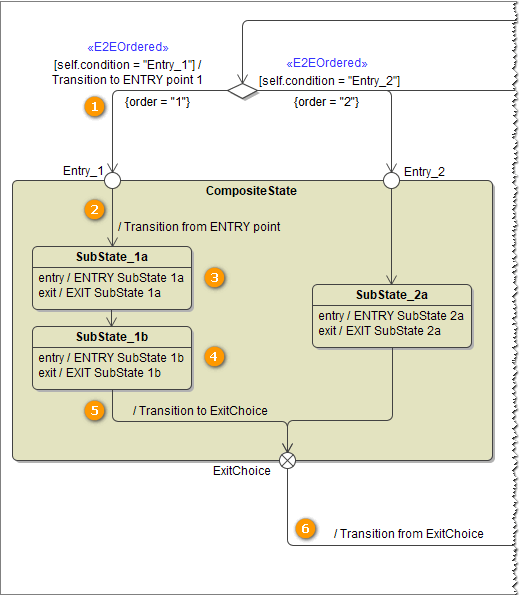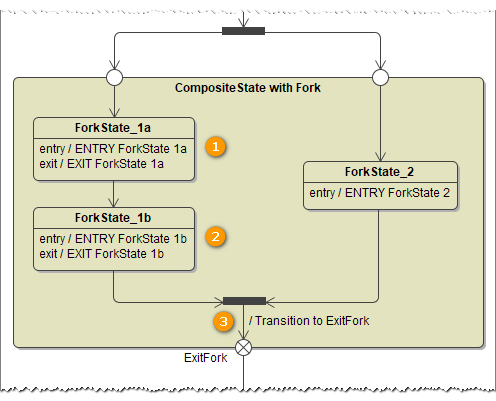The E2E xUML Runtime works with the concept of sessions. Sessions are equivalent to units of work, that can be committed or rolled back depending on the status at the end of the session. Refer to xUML Runtime Transaction Concepts for more details on the transaction concept in general.
Transaction Rollback Behavior
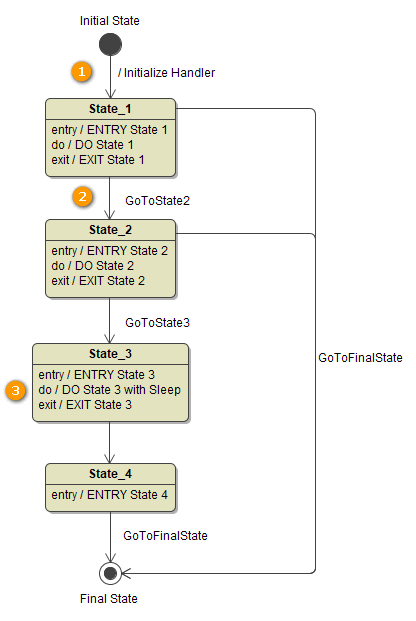
Persistent state transactions will behave on rollback like listed in the tables below:
Simple State Machine
| Persistent State Transaction | Error in | Behavior | State | |
|---|---|---|---|---|
| 1 | init state - initialize handler - entry action | initialize handler | object not created | - |
| entry action | object not created | - | ||
| 2 | exit action - transition - entry action | exit action | rollback of exit behavior changes | source state |
| transition | rollback of changes on transition and exit behavior | source state | ||
| entry action | rollback of entry behavior, transition and exit behavior changes | source state | ||
| 3 | do activity | do activity | rollback of changes Exit action will wait until do activity is finished. | state machine continues with object lifecycle (independent of error), see also Do Activity Particularities below |
State Machine with Fork and Join
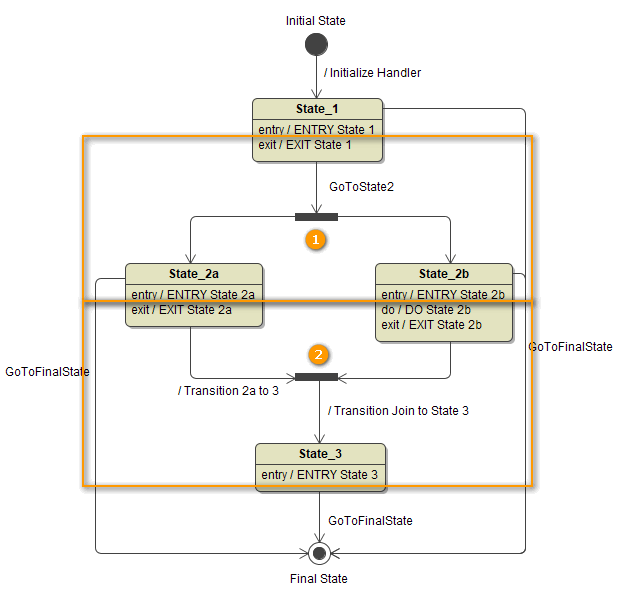
| Persistent State Transaction | Error in | Behavior | State | |
|---|---|---|---|---|
| 1 | exit behavior + transition + fork + multiple(transition + entry behavior) | entry action | rollback of all forked transitions, if one fails | state before fork |
| 2 | multiple(exit behavior + transition) + join + entry behavior | exit action | rollback of exit behavior changes | faulty state and general join state |
| transition | rollback of changes on transition and exit behavior of faulty path | faulty state and general join state | ||
| entry action | rollback of entry behavior and transition from join to next state | general join state | ||
State Machine with Choice
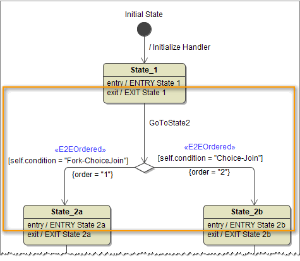
| Persistent State Transaction | Error in | Behavior | State |
|---|---|---|---|
| multiple(exit behavior + transition) + choice + multiple(transition + entry behavior) | entry action | rollback of changes | source state before choice |
State Machine with Substate Machine
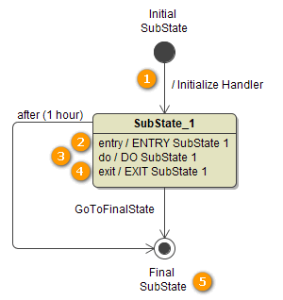
| Persistent State Transaction | Error in | Behavior | State |
|---|---|---|---|
| substate machine | 1 initialize handler | rollback of changes | source state |
| 2 entry action | rollback of changes | source state | |
| 3 do activity | rollback of changes Exit action will wait until do activity is finished. | state machine continues with object lifecycle (independent of error), see also Do Activity Particularities below | |
| 4 exit action | rollback of changes | faulty substate and general submachine state | |
| root state machine | 5 entry state after substate | rollback of changes of entry action, no rollback of exit substate actions | general submachine state |
State Machine with Composite States
| Persistent State Transaction | Error in | Behavior | State |
|---|---|---|---|
composite states (choice + two entry points) | 1 transition to entry point | rollback of changes | source state before choice |
| 2 transition from entry point | rollback of changes | source state before choice | |
| 3 entry action of first substate | rollback of changes | source state before choice | |
| 4 entry action of second substate | rollback of changes | faulty substate and general composite state | |
| 5 transition to exit point | rollback of changes | source state and general composite state | |
| 6 transition from exit point | rollback of changes | general composite state | |
composite states (fork + two entry points + join within composite)
| 1 entry action | rollback of all forked transitions, if one fails | state before fork |
2 entry action within composite | rollback of actions related to faulty branch |
| |
| 3 transition to exit point |
|
Do Activity Particularities
Persistent state do activities are handled by the E2E Runtime different than other persistent state activities - they are processed asynchronously in a separate session and the persistent state object is not locked during execution of the do activity.
This may lead to the following issues:
- Concurrent Updates on the Persistent State Object
While the do activity is still processed by the E2E Runtime, the persistent state object can be changed by other processes. The Runtime will try to merge the changes in this case. If the do activity changes self.a and another process triggers a change of self.b, the final persistent state object will contain both changes. In case that both change the same attribute, the last change will win. - Error in Do Activity (1)
If an error occurs during execution of a do activity, the E2E Runtime will throw[PSADSM][29][Fatal error while executing doActivity(if no error handler is implemented) and rollback all changes of the do activity. Nevertheless, the persistent state object is not stalled but continues with its lifecycle.
In this case, it is best practice to implement an error handler that catches the mentioned error and does the necessary handling. - Error in Do Activity (2)
After a do activity, changes to the self-object are not automatically persisted. To modify contents of the persisted object, the do activity has to return the corresponding attributes as output parameters. In case of error (and rollback), this leads to the fact that the output parameters areNULL. As a consequence, the related persistent state attributes are set toNULL, too, and not rolled back to the previous value.
In this case, it is best practice to implement an error handler that catches the above mentioned error and does the necessary handling.
It is strongly recommended to use error handlers together with do activities. |
Apart from this, the do activity is the only activity within an persistent state object's lifecycle the modeler can be sure that the object is really in the desired state. So, for example, if you want to inform other parties that a persistent state object is in a specific state, you should always do this in the do activity. Otherwise, you can run into race conditions (e.g. if you use the entry action for this and the other party reacts very fast).
Implicit and Explicit Commits
Changes to persistent state objects are not saved to the persistent state database immediately, but on transaction end. This is called implicit commit. If an error occurs during a transaction, transaction changes will be rolled back to the beginning of the transaction (see xUML Runtime Transaction Concepts and Transaction Rollback Behavior).
Additionally, the following action types are part of the transaction and affected on commit / roll back if they were used in persistent state context:
All other actions or adapter calls (e.g. SOAP call, REST call, SAP access, ...) have to be rolled back manually in case of error.
User can force the persistent state machine to commit changes to the database by calling the Persistent State Adapter with action commit (see Committing Changes to the Persistent State Database). This is called explicit commit. Changes that have been explicitly committed will not been rolled back on transaction error.
Use explicit commits if you do not want certain actions to be rolled back on error, e.g. persistent state signals in case of conversations.
Regarding service robustness, it is not recommended to model too complex transactions, as rollback on error may lead to unwanted results. Better implement intermediate states that can serve as rollback-points in case of error. See also Do Activity for more information on do activities.
